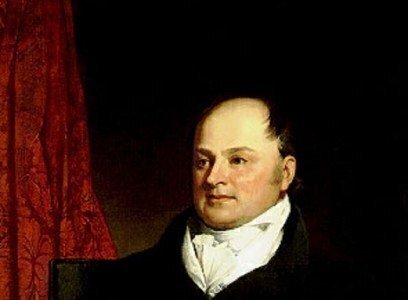We don’t talk a lot about the 12th Amendment at the National Constitution Center, but this week marks a milestone that is an important part of the Constitution: The amendment allows Congress to settle disputed presidential elections.
 The 12th Amendment was ratified on June 15, 1804, when New Hampshire became the 13th state to agree to add the amendment to the Constitution. It resolved a huge problem with the Constitution’s original provision for electing a president and vice president that led to the bitter 1800 election between Thomas Jefferson and John Adams, which left Jefferson in an election tie—with his own running mate, Aaron Burr.
The 12th Amendment was ratified on June 15, 1804, when New Hampshire became the 13th state to agree to add the amendment to the Constitution. It resolved a huge problem with the Constitution’s original provision for electing a president and vice president that led to the bitter 1800 election between Thomas Jefferson and John Adams, which left Jefferson in an election tie—with his own running mate, Aaron Burr.
Article II, Section 1, of the Constitution required electors in states to cast two ballots. There wasn’t a separate vote for vice president, and it was up to the political parties to coordinate among their electors to make sure vice presidential candidates had at least one fewer electoral vote than presidential candidates.
The Federalist Party did just that, making sure one elector voted for John Jay and ensuring that Adams had the most votes from his party. Jefferson wasn’t as attentive, leaving him in a tie with Burr in 1800.
The contingent runoff election between Jefferson and Burr was a true constitutional crisis. Jefferson ultimately won the House election on the 36th ballot after a week of voting. Alexander Hamilton, Jefferson’s long-time enemy, supported Jefferson instead of his old rival from New York, Burr.
And the 12th Amendment quickly followed. It was written, approved in Congress and ratified within three years, so that it was in effect for the 1804 election. The next amendment to the Constitution wouldn’t be ratified until December 1865.
The 12th Amendment made sure separate ballots were cast in the Electoral College for president and vice president; the House would settle an election without a majority winner with a contingent election featuring the top three vote getters; and the House would determine rules for conducting the election.
Twenty years later, Congress found itself in position to settle another presidential election that involved an Adams.
In this case, it was John Quincy Adams, who was one of four candidates who received electoral votes in a bitterly contested 1824 election much like the 1800 race involving his father.
Two of the candidates had been in Monroe’s nonpartisan cabinet: Secretary of State Adams and Treasury Secretary William Crawford. Andrew Jackson was the hero of the War of 1812, while Henry Clay of Kentucky was the powerful speaker of the House of Representatives.
In the general election, Jackson led on December 2, 1824 with 99 electoral votes, but he needed 131 to win the presidency. Clay came in fourth with 37 electoral votes, which was enough to cost Jackson the election.
Under the provisions of the 12th Amendment, the election in the House involved the top three vote getters: Jackson, Adams, and Crawford (who also had suffered a stroke during the election campaign).
A lame-duck Congress was left with the task of selecting a new president over the next two months. (A vice presidential candidate, John C. Calhoun, has easily won a majority of ballots.)
It was Clay, like Hamilton in 1800, who interceded to decide the House election, in favor of the New Englander, Adams. Clay secured enough votes for Adams to win on the first House ballot on February 9, 1825, despite Jackson’s wide lead in the popular vote.
The 12th Amendment worked. It allowed the House to adopt rules about conducting the vote that became a precedent, and a winner was selected on the first ballot. Each state had one vote in the process.
In an interesting footnote to history, the 1824 election wasn’t the only contest settled by the 12th Amendment. In 1837, Martin Van Buren won the election to replace Jackson as president, but there was dissent within the Democratic Party about the vice presidential candidate, Richard Mentor Johnson. During the Electoral College voting, 23 faithless electors refused to vote for Johnson.
According to the 12th Amendment, a contested vice presidential election is decided by the Senate. In February 1837, the Senate chose Johnson over a Whig rival, in a runoff election.







